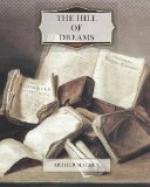This poor and desolate house had fascinated him. Ancient and poor and fallen, disfigured by the slate roof and the yellow wash that had replaced the old mellow dipping tiles and the warm red walls, and disfigured again by spots and patches of decay; it seemed as if its happy days were for ever ended. To Lucian it appealed with a sense of doom and horror; the black streaks that crept upon the walls, and the green drift upon the roof, appeared not so much the work of foul weather and dripping boughs, as the outward signs of evil working and creeping in the lives of those within.
The stage seemed to him decked for doom, painted with the symbols of tragedy; and he wondered as he looked whether any one were so unhappy as to live there still. There were torn blinds in the windows, but he had asked himself who could be so brave as to sit in that room, darkened by the dreary box, and listen of winter nights to the rain upon the window, and the moaning of wind amongst the tossing boughs that beat against the roof.
He could not imagine that any chamber in such a house was habitable. Here the dead had lain, through the white blind the thin light had filtered on the rigid mouth, and still the floor must be wet with tears and still that great rocking elm echoed the groaning and the sobs of those who watched. No doubt, the damp was rising, and the odor of the earth filled the house, and made such as entered draw back, foreseeing the hour of death.
Often the thought of this strange old house had haunted him; he had imagined the empty rooms where a heavy paper peeled from the walls and hung in dark strips; and he could not believe that a light ever shone from those windows that stared black and glittering on the neglected lawn. But tonight the wet and the storm seemed curiously to bring the image of the place before him, and as the wind sounded he thought how unhappy those must be, if any there were, who sat in the musty chambers by a flickering light, and listened to the elm-tree moaning and beating and weeping on the walls.
And tonight was Saturday night; and there was about that phrase something that muttered of the condemned cell, of the agony of a doomed man. Ghastly to his eyes was the conception of any one sitting in that room to the right of the door behind the larger box tree, where the wall was cracked above the window and smeared with a black stain in an ugly shape.
He knew how foolish it had been in the first place to trouble his mind with such conceits of a dreary cottage on the outskirts of London. And it was more foolish now to meditate these things, fantasies, feigned forms, the issue of a sad mood and a bleak day of spring. For soon, in a few moments, he was to rise to a new life. He was but reckoning up the account of his past, and when the light came he was to think no more of sorrow and heaviness, of real or imagined terrors. He had stayed too long in London, and the would once more taste the breath of the hills, and see the river winding in the long lovely valley; ah! he would go home.




